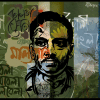Acquaintance

As I stood in front of my mother's old creaky closet, a wave of hotchpotch sensations washed over me. Pervading them all was mostly confusion. My mother's closet was a mismatched circus–of oversized sweaters, worn out sarees, and singular pieces of kameez. What struck me was how disorganised it was, how uncared for. Growing up, I remembered a motley of memories of my mother cleaning, dusting and organising. I remember her entering my room to rearrange the clothes inside my dishevelled closet, which left me with utter disdain and general annoyance. I had convinced myself that I would get around to it myself–even though I never really got around to it. I recalled experiencing a lump in my throat every time I watched my mother rearrange my closet as if I was incapable, and that she had breached my guarded privacy.
I handled each clothing item of my mother with as much care as I could muster. I wanted to organise them in a somewhat cohesive manner, even though they all seemed like an unsquared jigsaw puzzle. As I took out all her clothes and dumped them onto the bed, a few of them surprisingly caught my fancy. I tried on a grey sweater that barely fit me, and I took a deep whiff. It smelled of some cheap old perfume and naphthalene. I tried conjuring up the memory of my mother wearing that grey sweater, but no such memory crossed my mind. Every vision I saw of her was in a hazy saree, nothing in colour, nothing that stood out–or maybe I just hadn't paid much attention. I took a picture of myself in that dusty grey sweater on a worn-out mirror and sent it to my husband. He wrote back that I looked a lot like my mother and that I should keep the sweater. But I decided against it. At the end of the day, I didn't need the sweater–but some poor soul definitely did. I put my mother's lifetime worth of clothing into clear plastic bags, and piled them all up in bed.
I went to the kitchen to look for teabags and I found some on the dusty corner shelves. One of my mother's mugs had no handle on it, and the coating had faded away with time. I smirked a little. She always did have a hard time letting things go, I thought. I sipped on my cold tea and looked through her drawer. It felt like an invasion, something I would never have dreamt of doing growing up. But something told me she wouldn't mind. I found a gold pendant which I decided to keep. I wore it around my neck and looked in the mirror. Did my mother ever wear this pendant? Had she saved it for special occasions? Or had she worn it to my wedding? I couldn't say.
I changed my mind about keeping the pendant and went on over to the plastic bags which held her clothes. The grey sweater lay at the bottom of the pile; I pulled it out and put it on. The sweater hugged my body–it was itchy but somehow comforting, cold but also warm. Going through my mother's chest of drawers, I found a diary of Du'as, in handwriting similar to that of a child. I found another diary containing phone numbers, with its faded vanishing blue ink-stained paper. There were cutouts of discount coupons in the bags, loose pearls from a necklace, a ketchup packet, and her birth certificate–among other things. The birth certificate mocked me bitterly because of how old it was. I knew I was to hold a shiny new death certificate in a few days time.
As I rummaged through her belongings, I found that she loved the colour green, and that she collected 5 taka coins and kept them in a bundle. I found that she never threw out perfume bottles, or her diaries. She had an assortment of pins, and she kept her sewing needles and threads in a rusty tin can. I found that she used Pringles containers for storing receipts and bills. My mother still had cassette tapes, despite not owning a cassette player. She had carrots in the fridge that had rotted, and soy-sauce that had expired four months ago.
Every drawer I touched mocked me. Every little nook in my mother's house was her being there. I never realised that my mother was a whole person–that she had a favourite colour, or a strange addiction. And now, there was no place for her things anymore. Her belongings were the belongings of a ghost. But then, why were they all so alive? The pins, the mugs, the pendant, the perfume bottles, the grey sweater?
I clutched my dead mother's grey sweater and I cried into them. I apologised, I heaved. I got up and washed my mother's tea mug. I took out all her belongings, trying not to think of anything–but the thoughts came, slowly creeping up my skin. I took another look around the old apartment for signs of my mother–they were there. I could not scrub it clean off of her. I took out an old page from one of her diaries and wrote in my childlike handwriting:
"Ammu I am sorry. Today I took out all your belongings and I have decided to donate them, because I know how much you loved charity. I hope you are happy, wherever you are. And I'm sorry it took me so long to get to know you. But I've gotten to know you today–and I think you're great, I hope you can forgive me."
The tears came again and I welcomed them. I left the note on the table for my mother to see and I believed with all my heart that somehow, she would see it.
Tasnim Naz is an academician of English Literature in Bangladesh University of Professionals. Her research interests are Feminism, Diasporic Study, and Postcolonial Studies. Reach her at [email protected].

 For all latest news, follow The Daily Star's Google News channel.
For all latest news, follow The Daily Star's Google News channel. 











Comments